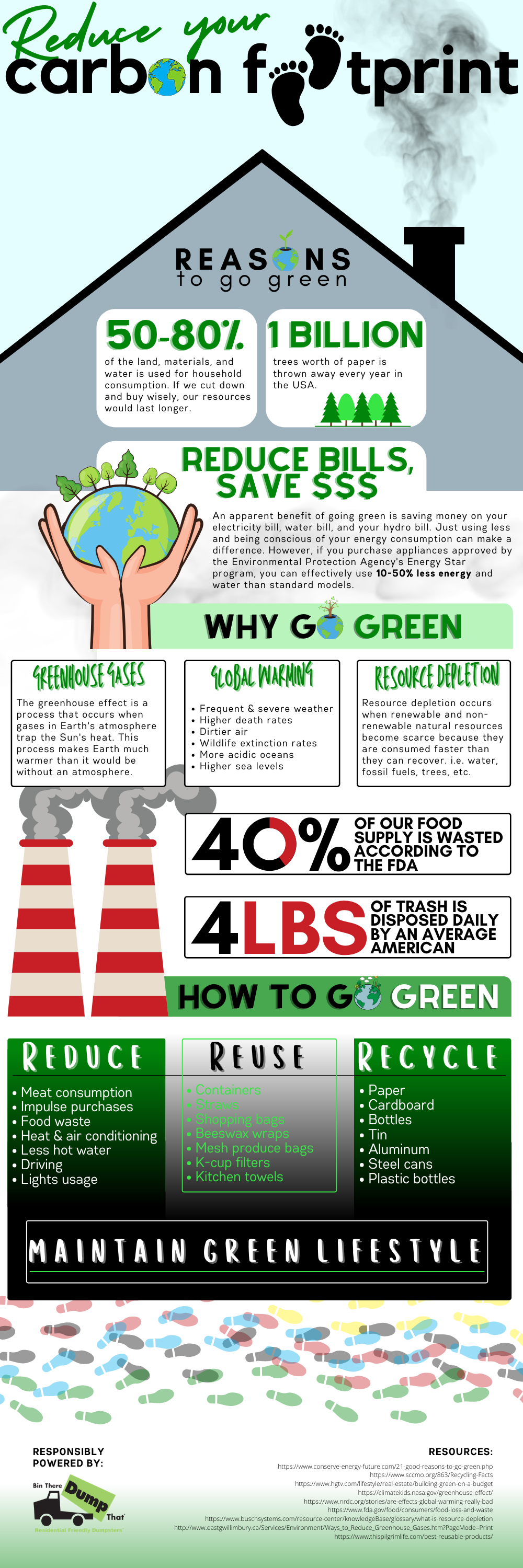Steps You Can Take To Reduce Your Carbon Footprint
Earth Day is upon us and now is the best time to be earth conscious. Our global carbon footprint affects the planet and the lifestyle of the future generations. So, it’s a great time to talk about what and how to reduce carbon footprint.What Is a Carbon Footprint?
You've probably heard the term "carbon footprint" in conversations about global warming or the environment. It's used to describe the impact an individual, organization, or event has on greenhouse gas emissions. These gases contribute to the greenhouse gas effect, a phenomenon that occurs when gases in the Earth's atmosphere trap the Sun's heat, which has negative effects on the environment.
While it's difficult to precisely measure one's carbon footprint, you can use various online carbon footprint calculators to estimate your household's impact.
Doing your part to help sustain the life of our planet involves much more than just recycling. In fact, 50 to 80% of land, materials, and water are used for household consumption. Whether you're looking to save money or save the world, here's a helpful guide to get you started on your journey to a more environmentally conscious lifestyle.
Why Should We Care About Our Carbon Footprint?
These emissions contribute to frequent and severe weather, and they steadily accelerate the impact of global warming by increasing wildlife extinction rates, human death rates, and the acidity of the world's oceans. Our collective carbon footprint and its role in the development of climate change can also have damaging effects on local economies that are dependent on natural resources.
What makes carbon footprint worse?
- Energy Inefficiency:
Using outdated appliances that are not energy efficient or having a home that is poorly insulated can lead to excessive energy consumption. This is especially true for heating and cooling, which are among the largest contributors to household energy use.- Poor Insulation:
Living in a poorly insulated home can lead to excessive heating or cooling energy use to maintain comfortable temperatures.- Car Dependency:
Regular use of gasoline or diesel-powered vehicles, particularly for short trips where alternative transport could be used, contributes heavily to your carbon emissions.- Large Home Size:
Bigger homes generally require more energy to heat and cool, which means a greater carbon footprint, especially if the space isn't being utilized efficiently.- Use of Fossil Fuels:
Using natural gas for heating or cooking and gasoline for lawn mowers or backup generators adds to your home's carbon emissions.Is It Easy to Reduce My Carbon Footprint?
Absolutely! Reducing your carbon footprint can be a straightforward and rewarding process, encompassing both minor tweaks and more significant changes to your daily habits. Embarking on a more eco-conscious path doesn't have to be abrupt or challenging. There are quite a few starting points to help you transition to a greener lifestyle without taking a deep dive too quickly.

What are 5 ways we can reduce your carbon footprint?
- Reduce consumption practically:
The meat industry, food waste, water and energy usage, and rampant consumerism all contribute to the depletion of the world's resources and overall health. Start small by practically adjusting your diet, taking shorter showers, and being more conscious about impulse purchases.- Recycle weekly:
You don't have to throw everything away! Cardboard, paper, aluminum, various plastics, and glass can be recycled at local facilities. Research your local recycling plant and contact them about pick-up schedules.- Invest in ENERGY STAR products:
ENERGY STAR appliances and products are an effective way to save on energy bills while also protecting the environment—they even use 10 to 50% less energy and water than standard appliances! These EPA-backed products have resulted in $350 in residential and commercial energy cost savings for every $1 the EPA has spent on ENERGY STAR.- Reuse items within your household:
Not everything can be recycled, but before you toss something, determine whether the item can be reused or repurposed within your household.- Embrace Home Gardening and Local Produce:
Growing your own vegetables and herbs or purchasing locally-grown produce can greatly reduce the carbon footprint associated with food transport and large-scale agriculture. Gardening at home, even if it's just a few pots on a balcony, can minimize your reliance on store-bought goods and provide a rewarding way to engage with your food source directly. Supporting local farmers' markets not only helps the environment but also boosts the local economy.In short, being more thoughtful about your personal impact on the planet makes a difference. It's not just beneficial for the world around you; reducing your carbon footprint can improve your health and quality of life. At Bin There Dump That Corporate, our mission goes beyond dumpster rentals—we're dedicated to managing and disposing of our clients' trash in a responsible and professional manner. Find your nearest Bin There Dump That franchise location to get started with efficient and convenient dumpster rental services.
Looking for a FREE Quote?
Our Dumpster Consultants are waiting to help you find an affordable solution to your waste disposal needs; we can't wait to help you with your project!
Our Favorite Tips By To Reduce Carbon Footprint By Bloggers
- Good Housekeeping has 45 tiny lifestyle changes that you can make right now to help save the planet.
- Rebecca from Minimalism Made Simple has 25 simple ways to live greener
- Dawn from Small Footprint Family has 40 ways to save money just by going green
- Candice from The Edgy Veg has 20 sustainable swaps to help reduce waste
- Sarah from Live Eat Learn has 13 recipes that can help reduce your carbon footprint
- The Inspired Home has general tips on how to waste less and cut your carbon footprint
- The Design Swan has 5 simple ways to reduce the carbon footprint of your home
Request a Free Quote Near You!
Friendly, professional customer service, plus fair pricing, equals value.
Request a Free QuoteFREE EBOOK

Everything you need to know about renting a dumpster
Download NowFREE INFOGRAPHIC

Skip The Gym and Burn Calories While Doing Your Household Chores
Learn MoreFREE CALENDAR DOWNLOAD

28 Day Cleaning Schedule
Download Now

